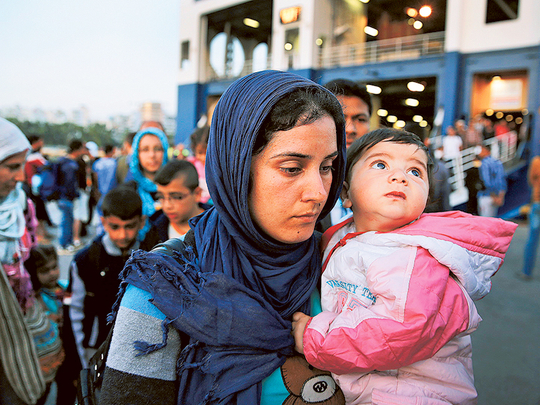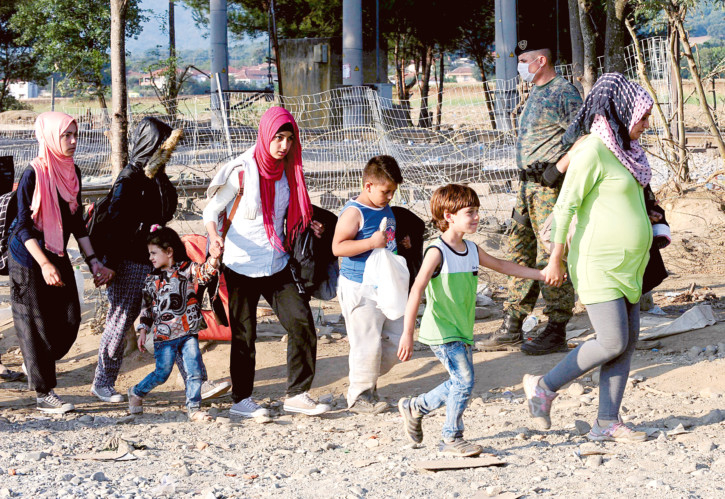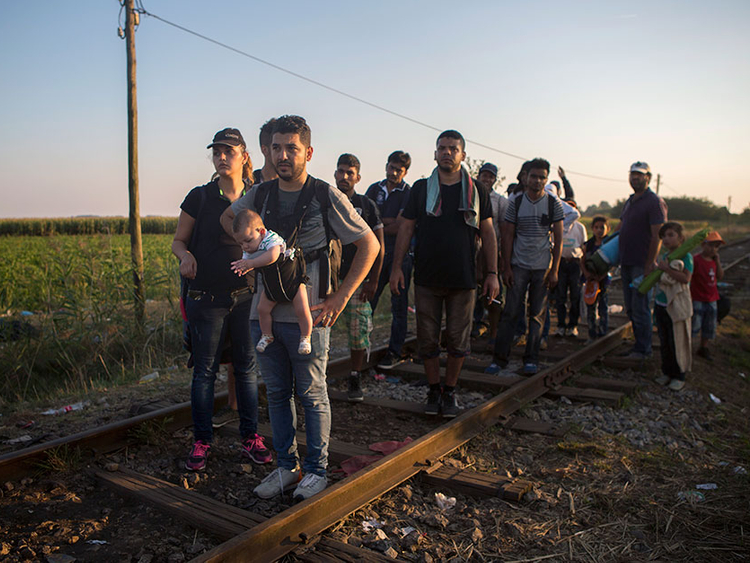
Istanbul, Calais, France/Budapest: At least 12 Syrian refugees trying to reach Greece drowned on Wednesday when two boats sank in Turkish waters, the Turkish coastguard and media said, as an image of a toddler’s lifeless body washed ashore sparked horrified reactions on social media.
The Turkish coastguard said in a statement that two boats had sunk after separately setting off from Turkey’s Bodrum peninsula for the Greek Aegean island of Kos early Wednesday.
The corpses of 12 refugees including five children and one woman were found and 15 people were rescued, with some surviving after reaching the shore in life jackets.
A Turkish police officer stands next to a refugee child's dead body off the shores in Bodrum, southern Turkey, on September 2, 2015 after a boat carrying refugees sank while reaching the Greek island of Kos. The baby's image sparked horrified reaction on social media with the hashtag #KiyiyaVuranInsanlik ("Humanity Washed Ashore) making it to Twitter's top world trending topics. AFP
The coastguard, backed by helicopters, was continuing its search for three people still missing, the statement said.
The Dogan news agency published an image of a corpse of a little boy wearing a red T-shirt lying facedown on the beach near Bodrum, one of Turkey’s prime tourist resorts.
The hashtag “#KiyiyaVuranInsanlik” (“Humanity washed ashore”) made it to Twitter’s top world trending topics after the image was widely shared.
Here's how to help refugees:
Dogan said that most of the refugees were from the Syrian Kurdish town of Kobane who fled to Turkey last year to escape violence by Daesh extremists.
Meanwhile, hundreds of refugees poured overnight onto the high-speed railway linking Paris with London near the French port of Calais, stranding thousands of passengers in darkness for hours aboard Eurostar trains.
At the EU’s opposite end, another angry crowd camped outside a Budapest train station demanding to board trains for Germany, as Europe’s asylum system crumbled under the continent’s biggest migration crisis since the 1990s Balkan wars.
Hundreds of thousands of refugees fleeing wars and economic refugees escaping poverty have arrived in the EU in an unprecedented wave that has confounded EU leaders and fed the rise of right-wing populists.
Nearly all first reach the EU’s eastern and southern edges and then press on illegally for richer and more generous EU countries further north and west.
The EU’s executive European Commission promised to unveil a new policy next week to make it easier to process asylum claims, distinguish bona fide refugees from other refugees, send those from safe countries home, and distribute those with genuine asylum claims among the bloc’s 28 members.
Meanwhile, authorities have struggled to enforce rules which ordinarily allow free movement within the EU, but not to undocumented refugees.
Hundreds took to the tracks around France’s Calais-Frethun station, the latest target for those trying to reach Britain, which many regard as a better place to live than countries on the continent.
Rail operator SNCF was forced to halt services near the entrance to the Channel Tunnel. Three Eurostar trains were blocked overnight and eventually continued to London early on Wednesday, while two returned to their departure stations.
Passengers on one London-bound train, which stopped less than 1.6km from the tunnel, were told at one point to keep quiet and listen for people on the roof. A helicopter with a searchlight circled as guards walked the tracks.
With the power out, passengers sat in stifling darkness for nearly four hours. A woman in business class wept.
Eurostar later pulled the train back to Calais, where passengers disembarked for fresh air and bottled water.
About 3,000 to 4,000 refugees from the Middle East, Asia and Africa camp near Calais, dodging police as they try to board trains and trucks heading to Britain through the tunnel or on ferries. They have disrupted passenger and freight transport between Britain and France throughout the summer.
A spokeswoman for Eurotunnel, which operates the railway tunnel beneath the channel, said that as security has been tightened at Calais port and the tunnel entrance, refugees have sought new entry points such as Calais-Frethun, about 5km inland, beyond a zone controlled by Eurotunnel.
In Hungary, hundreds of refugees protested in front of Budapest’s Keleti Railway Terminus shouting “Freedom, freedom!” and demanding to be let onto trains bound for Germany.
More than 2,000 refugees, including families with children, were waiting in the square at the station while Hungarians with IDs and foreigners with valid passports could board the trains.
Germany, which is prepared to take by far the greatest number of refugees, has begun accepting asylum claims from Syrians regardless of where they entered the EU, even though undocumented refugees are barred from travel across the bloc.
That has caused confusion for neighbouring countries, which have alternated between letting refugees through and halting them.
Hungary, the main arrival point for those crossing the Balkans by land, allowed thousands to board trains for Germany on Monday but has since called a halt, creating chaos at the rail station. A government spokesman said Hungary would observe EU rules which bar travel by those without valid documents.
“I want my freedom, I have been on the road for a very long time, and now I am in the European Union, and I want my freedom,” said Sanil Khan, 32, leader of a group of about 100 young men who marched behind a cardboard cut-out Afghan flag in a tight formation.
The men were joined by hundreds of others, who broke into loud cheers and chants of “Freedom, freedom!” and “Germany, Germany!”
The migration crisis has confounded the EU, which is committed to the principle of accepting refugees fleeing real danger but has no mechanism to compel its 28 member states to share out the burden.
EU Commission President Jean-Claude Juncker is expected to unveil proposals to tackle the migration crisis in an annual state-of-the-union address to the European parliament next week.
Interior ministers hold an emergency meeting five days later.
Europe’s immigration commissioner, Dimitris Avramopoulos, a former Greek foreign minister, said new plans would include proposals to aid the processing of asylum claims in Greece, Italy and possibly Hungary.
Those whose asylum claims are rejected could be detained until they return home. The EU would publish a list of safe countries of origin making it easier to process claims.














